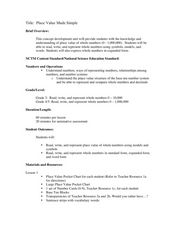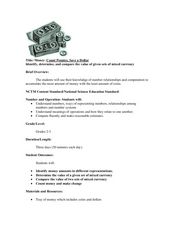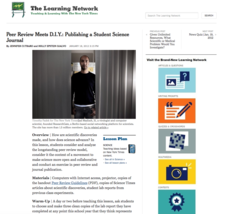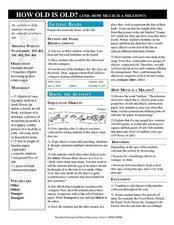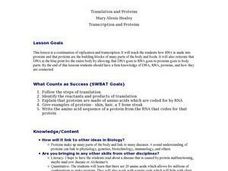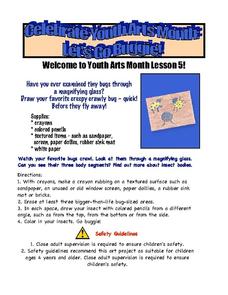Curated OER
Children's Literature Across the Curriculum Ideas-If You Made A Million
Pupils read If You Made A Million by David M. Schwartz. They complete a variety of cross-curricular activities surrounding the study of earning, saving and spending money. Included are reading, art, math, science, writing, social...
Curated OER
Place Value Made Simple
Elementary schoolers explore place value to the millions place. They construct and evaluate the value of numbers. Working in small groups, pupils problem solve with pocket place value charts, and examine standard and expanded forms. This...
Curated OER
Parts-Per-Million Concentration Lab
Students develop a comprehension of parts per million as a concept. They work in teams to create successive dilutions of a solution to reach a parts-per-million concentration. Students list what they think the atmosphere is made of. They...
Council for Economic Education
I'll Trade You a Bag of Chips, Two Cookies, and $60,000 for Your Tuna Fish Sandwich
If you are looking for a great activity on supply, demand, market price, demand curves, and data analysis look no further. With glossary definitions, activities, and web lined resources this activity is a winner.
Curated OER
How Much is a Million?
Fifth graders explore the relationship between customary and metric units of measurement. Through discussion and hands-on activities, they discover how units of measurement are related. Students create a millions book to aid in their...
Curated OER
Million Dollar Machine
Students explore their self-awareness. They discuss the words unique, extraordinary and irreplaceable and their strengths and weaknesses. They write five things their bodies or Million Dollar Machines can do and investigate their blood...
Two Lives Left
Cargo-Bot
What would you think of an app that provides a creative introduction to an important 21st century skill, challenges learners at many levels, and is an addictively, fun game? Did we also mention it was free? We think you will find all...
Curated OER
Money: Count Pennies, Save a Dollar
Learners determine how to make the largest sum of money using the least amount of coins. In this mixed currency lesson plan, students listen to a reading of If You Made a Million by David M. Schwartz before participating in money...
Curated OER
Peer Review Meets D.I.Y.: Publishing a Student Science Journal
Peer review of science laboratory reports? You bet! First, learners work in pairs to review a scientific article. Then they trade lab reports for peer review. The end result is the publication of a classroom scientific journal!
American Museum of Natural History
What Do You Know About Horses?
A 10-question online quiz tests scholars' knowledge about horses: all answers come with an informative explanation.
Penn Museum
Maya Ball
Sure the ancient Mayan civilization had an advanced calendar and mathematical system, but did you know that they also played a great team sport like basketball? Invite your learners to discover the great ballcourt at Chichen Itza and...
Curated OER
Millions, Billions, Trillions
Students use real-world data to compare the relative sizes of millions and billions, and exponential growth. They use the salaries of famous people such as, Michael Jordan and Bill Gates to understand this math concept.
Curated OER
Can You Bag It?
Put your class's observational skills to the test with a science experiment about paper and plastic bags. After reading some background knowledge about the materials in plastic grocery bags, third graders interpret a chart to answer a...
Desert Discoveries
How Old is Old? (And, How Much is a Million?)
Here is an interesting lesson on how old things are designed for young scientists. In it, learners compile a list of their birthdays, and the class puts them in sequential order from youngest to oldest. Then, they sequence 15 objects...
Curated OER
Are You One Of Us?
Students discover how to classify things based on their similarities and differences. Students give the characteristics of insects and create a classification list. Given examples of various types of insects, students classify them...
College Board
AP Physics 1 and 2 Inquiry-Based Lab Investigations
Have you ever wondered what type of AP Physics investigations The College Board wants? This is the guide for you! Sixteen labs covering both Physics I and II will get you started and inspire you to meet the requirement of 25 percent of...
Curated OER
Recycling Quiz
Ten multiple questions about recycling comprise this quiz. Administer this as a pre-test prior to presenting a lesson on recycling glass, plastic, and metals. Since an answer key is provided along with comments, you can use it as a guide...
Curated OER
Reading and Writing Numbers
Those are some long numbers! Scholars write number-form digits in word form and vice versa. The first eight are six-digit numbers and the next eight are seven-digit numbers. There are two examples to get them started. Remind scholars to...
Curated OER
Translation and Proteins
Learners follow the steps of translation and identify the reactants and products of translation. They able to explain that proteins are made of amino acids which are coded for by RNA. Students are able to give examples of proteins--...
Curated OER
Magazine Mosaics
Almost every teacher has a stack of old magazines lying around. Get creative and turn them into mosaics! That's right, this resource explains how kids draw, design, cut, and paste to create mosaic art from recycled magazines. Connect...
Arts & Humanities
Let's Go Buggie!
To celebrate art youth month, little ones get out the magnifying glasses and get close-up with bugs. They make scientific observations of bugs you bring into the classroom. Then, they use markers, clay, paint, or crayons to make artistic...
Curated OER
The Math in the Design and Building of Bridges
Research various types of bridge designs. Your class will be asked to consider what it would be like without bridges while learning about how they work. They will construct a model bridge based on given parameters. They then calculate...
National Institute of Open Schooling
Water Pollution
Fifteen million children under the age of five die each year due to diseases in their drinking water. Water pollution is the topic of lesson 34 in the series of 36. Scholars, through reading and discussing, study numerous aspects of...
Media Education Lab
Propaganda Techniques
In an age of fake news, alternative facts, and biased reporting, it is more important than ever that 21st century learners develop the critical-thinking skills necessary to recognize, analyze and resist the propaganda techniques used in...

